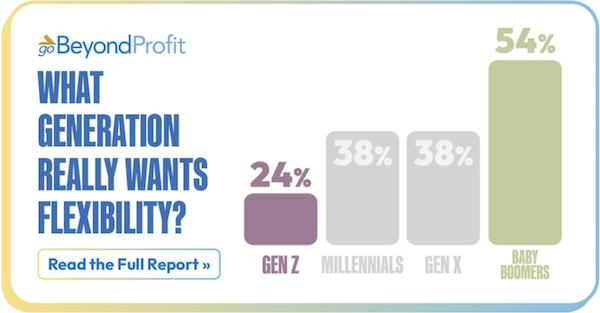The Real Surprise in Flexible Work: Why Baby Boomers Value It Most
Friday, October 17th, 2025
The 2025 Generosity by the Generations Report challenges the popular narrative that younger generations are rejecting the return to the office. The data reveals that while flexibility is a universal desire, its meaning and importance vary dramatically across the workforce.
Baby Boomers value flexibility the most. An astounding 54% of Baby Boomers say a flexible work schedule is the most important way a company can show generosity to its employees. This is more than double the rate for Gen Z (24%), suggesting that flexibility is a primary motivator for older workers.
Gen Z’s priorities are split. Contrary to many stereotypes, Gen Z doesn’t prioritize flexibility above all else; this generation believes mental health support is just as important as flexible work, with both elements receiving a 24% rating as the most important demonstration of generosity.
Millennials seek balance. While 2 out of 3 Millennials believe flexibility is a very important demonstration of generosity to employees, they also consistently value a range of other benefits. For instance, they are more likely than their peers to elevate expanded maternal health services (56%), mental health support (64%), and childcare support (52%) as very important. This suggests that while flexibility is a crucial part of their work–life balance, these additional benefits provide the support they need to return to the office.
The findings of the 2025 Generosity by the Generations Report are clear: a one-size-fits-all flexibility policy is not enough. By recognizing that flexibility means something different to each generation—whether it’s autonomy for Baby Boomers, mental health support for Gen Z, or work-life balance for Millennials—companies can build a culture that truly supports every employee.



